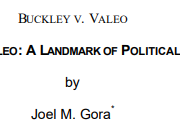Authored by Ashutosh Bhagwat
Abstract:
In a recent opinion respecting denial of certiorari, Justice Clarence Thomas expressed concerns about the degree of control that a handful of social media platforms exercised over political discourse, and suggested common carrier regulation as a potential solution to this perceived problem. The States of Florida and Texas promptly adopted legislation restricting social media companies’ ability to control content and users on their platforms, explicitly citing the common carrier concept in support. In this paper, I argue that even under Justice Thomas’s (probably incorrect) definition of common carriage, and certainly under the traditional definition, platforms simply are not common carriers. They do not possess any of the characteristics that Justice Thomas himself cited as typical of common carriers; and, more fundamentally, they lack the necessary characteristic—indifference to the content they carry—that is typical of communications common carriers. Indeed, and ironically, it is precisely because platforms are not indifferent to content, and act on their preferences (in particular by deplatforming President Trump), that Thomas proposed, and Florida and Texas adopted, platform regulations. These regulations, however, clearly violate the First Amendment, and appear to be headed for rapid judicial invalidation. Social media platforms, in short, are not common carriers, and cannot be forced to become ones by legislative fiat so long as the First Amendment remains in force. This essay concludes by arguing that common carrier regulation of social media platforms is not only unconstitutional, but also a terrible idea as a matter of public policy.














